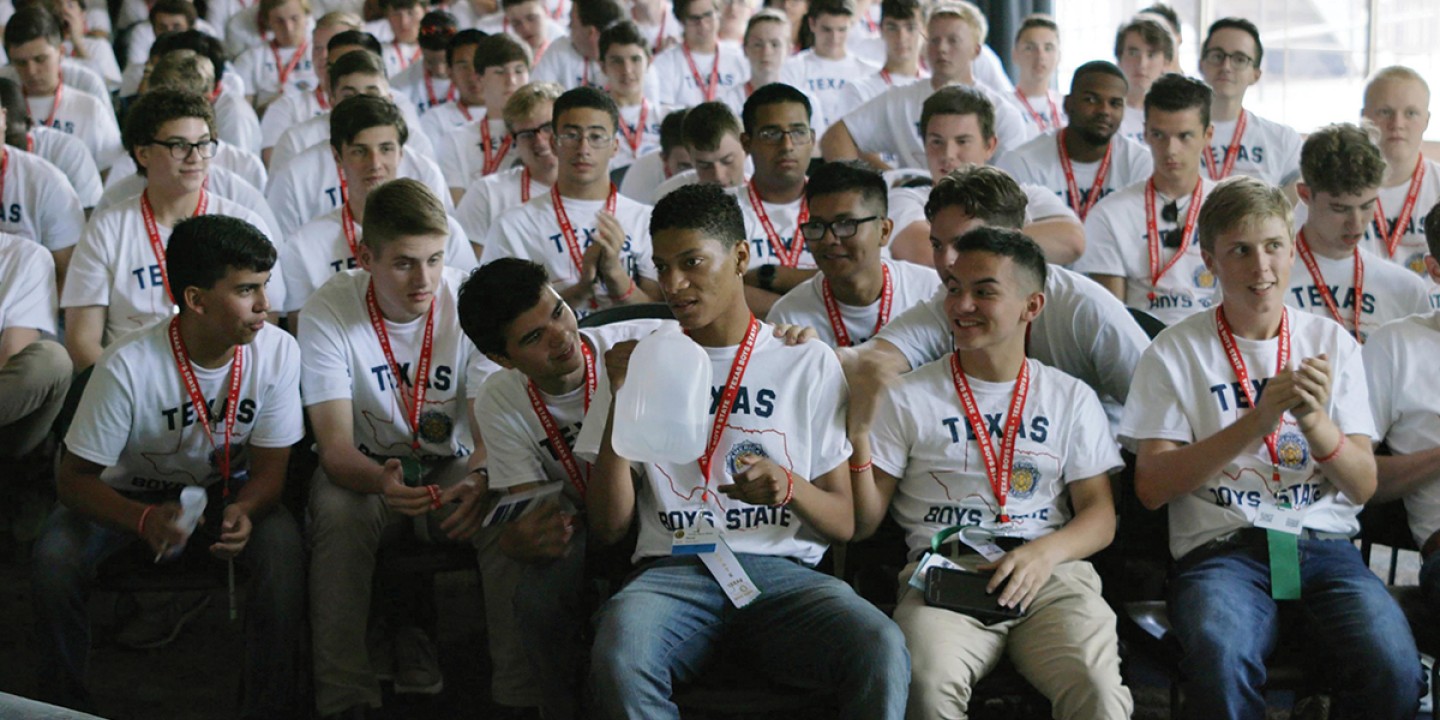
During the opening credits of the fine new documentary Boys State, a litany of well-known alumni stream past: Bill Clinton, Dick Cheney, Cory Booker, Samuel Alito, Rush Limbaugh. A week away at a camp designed to simulate our electoral and governmental system has helped more than a few budding careers.
Boys State and Girls State were founded in response to the Communist-affiliated Young Pioneers of America camps of the early 20th century. Sponsored by the American Legion, they gather rising seniors identified as leaders for an intensive week of mock elections and governance at all levels of municipal and state government. Two of those hundreds of Boys and Girls State participants will move on to Boys Nation and Girls Nation, where they act the part of US senators. Ever seen that photo of a teenage Clinton striding forward to shake JFK’s hand? That was at Boys Nation.
Read our latest issue or browse back issues.
I attended North Carolina Boys State at Wake Forest University in the summer of 1991. My Harvard-bound roommate nominated me for mayor of our city and then for governor of the whole shebang. I became mayor but lost the primary race for governor. I was a second alternate for Boys Nation.
I learned a lot that summer. I learned how quickly people will pledge their support to you and how quickly they’ll forget they did any such thing. I remember counting the votes folks had promised to me and figuring I’d be our party’s nominee for governor—before finishing third, with only two cities out of 20 sticking by me. And I entirely forgot what I’d promised to whom in return for their support. I didn’t even remember the platform I was running on. Never mind. Just win, baby.
For their documentary, filmmakers Amanda McBaine and Jesse Moss followed the events of Texas Boys State in 2018. We meet Ben Feinstein, a conservative who walks on prosthetics from a childhood illness, who orchestrates what turns out to be the winning campaign for governor. We also meet René Otero, an African American who moved to Texas from Chicago, who captures the Democratic Party chairmanship.
Otero has the best lines in the film. At the beginning of the week, he marvels, “I’ve never seen this many White people in one place.” Once in power, preparing for an unruly meeting, he plans to “pull out some old church tricks” to shut down his opponents. When only 12 people in his party vote against a proposal, he suggests the faction trim their political ambitions and form an intramural basketball team instead. He also expresses anxiety that he’s fallen into some sort of “conservative indoctrination camp.”
I remember the feeling. Boys State was where I first heard Lee Greenwood’s “God Bless the USA” sung with revival-like euphoria. I wasn’t theologically trained yet, but I knew the god being spoken of had little to do with a certain Jew from Nazareth. This god did have a lot of interest in power, however.
Watching Boys State and remembering my own experience, I realized how much politics has changed in the South since 1991. Between then and now, White liberals seem to have all but disappeared from the region that gave us Lyndon Johnson, Jimmy Carter, and Bill Clinton. As the right launched scorched-earth attacks on each of those presidents over race and other issues, decrying socialism and hustling conspiracy theories, it took over the South along with the Republican Party.
Perhaps it’s the filmmakers’ framing, but it seems the only two issues discussed much at Texas Boys State are abortion and gun control. (Immigration comes in a distant third.) Several participants opine that the crime of rape shouldn’t be paid for with the death of an innocent unborn child (though one boy does suggest castrating the rapist, to a jubilant response). Here, perhaps we see the problem of letting boys think they can run the world with no women in the room. No one will speak in favor of abortion rights from the stage, though one boy admits privately he is pro-choice. He also admits a new appreciation for politicians who lie their way into office.
One brave gubernatorial finalist, Steven Garza, who is Latino, speaks up for limitations to gun ownership. He has no choice—his opponent has excoriated him on social media for leading a March for Our Lives rally in Houston. Garza tries a middle-ground approach, calling for universal background checks and restrictions on military-grade weapons. His opponent takes an unapologetic pro-gun stance. I don’t have to tell you who wins.
“If you want the big guns, vote for the Barrett,” one candidate bellows. Otero, the lone Black leader in power, continually faces calls for impeachment because he won’t support proposals for Texas to secede from the United States. A judicial candidate denounces “Clinton-loving, abortion-supporting, fake-news-supporting, liberal snowflakes who want to take away our guns.”
We were not less racist or narrow-minded in 1991, to be sure, but we didn’t talk that way at the mic. I suspect my peers would have supported gun ownership and worried over abortion, but we wouldn’t have imagined those were the only issues that mattered, especially at the state level. And we would have minded our manners a bit more.
Mostly, we had lots of dreary debates about budgets. After I lost the governor’s race, I had to lead our city through a budgeting process like those tended by the blessed souls in public service at every level of government every year. Winners of House and Senate races and the governor’s seat had to do the same. It’s the conundrum of our politics. Those who entertain and shock tend to get attention and votes, but the reward for winning races is really, really boring—and really, really important. Those policy details are where lives are improved or degraded. If only we had a better way of selecting folks for the posts that make those decisions. But that’s the problem with democracy: you get who the people want.
When Jesse Ventura began a celebrity-driven foray into politics that was a sort of John the Baptist to Trump’s Jesus, Garrison Keillor drew attention to the wheelchair curb cuts that are now omnipresent at the sidewalk corners of city blocks. Someone recognized the need for those ramps, convinced governments to pay for them, and made sure they were installed and maintained. It must have been boring work, full of frustrations and compromises, but it dignified our life together by making things a little easier for people with disabilities. Such quotidian things are what politics is really about, but they don’t make great campaign slogans.
At one point in the documentary, students nod sagely as a local teacher describes the different dystopias imagined by George Orwell and Aldous Huxley. The latter was closer to correct—we seem intent on entertaining ourselves to death. I recognized the irony of being entertained by a film that reveals the dangers of twinning entertainment and politics. It won’t be the last bump on the road to some sort of renewed public trust.
A version of this article appears in the print edition under the title “Playing politics.”





